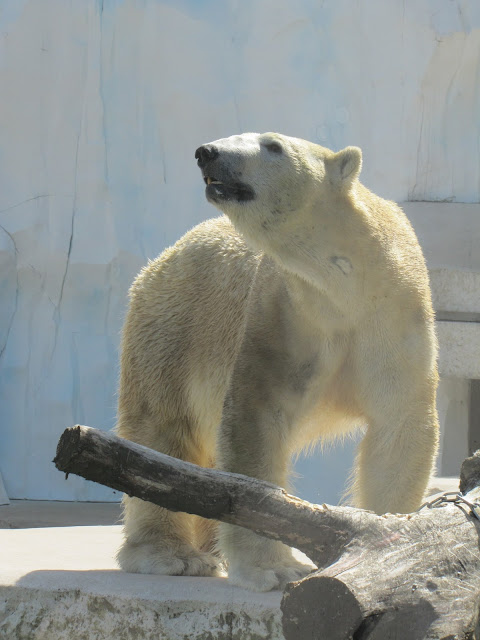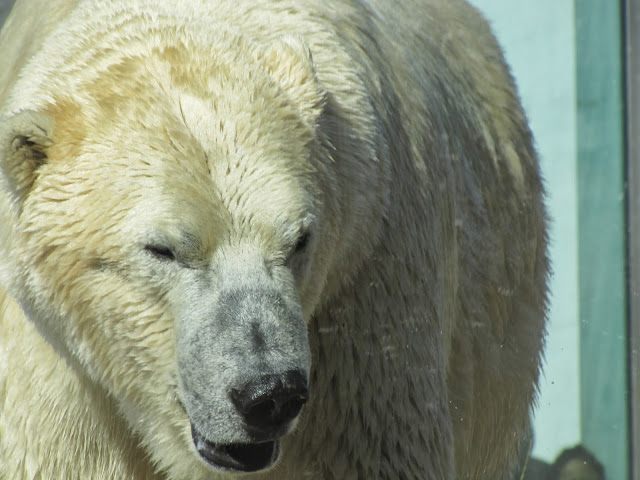For International Polar Bear Day, February 27, I have put together a story about this season's polar bear cubs, born in November and December of 2024.
For several months, we though there were only four cubs, the baby in Karlsruhe, and the three in Japan. Then just a few weeks ago, we learned of four more: twins in Hungary, a cub in Perm Russia, and a little girl in Brazil!
So now eight polar bear cubs in zoos have been announced this year worldwide, four singles and two sets of twins. Here, I try to give some family lineage, and how these cubs might be related.
We only know the gender of three of the cubs, the boy in Karlsruhe, the girl in Brazil, and the girl in Perm, but further announcements should be coming soon. So far, Nur in Brazil is the only one to make her public appearance, today, which is Polar Bear Day. None of the other cubs have made a public debut, but that also should be coming soon. And just one name so far, again, that of Nur in Brazil.
Family connections
Nuka and Kap's son is nephew of the famous late Knut, as Nuka is half sister, through their father Lars.
The late famous Aika of Tierpark Berlin would have been great grandmother to both Lloyd's twins in Hungary and Paula's twins in Japan. Aika was mother of Lloyd's father Eric, and Paula's father Bjorn-Heinrich.
The twins in Sosto Hungary are descendants of the famous American pair Olaf and Olga of the Henry Doorly Zoo in Omaha Nebraska, through their grandmother Olinka.
The cub in Karlsruhe is nephew of my favorite bear Raspi, through his half brother Kap, the father. Raspi is also great uncle of Shilka's cub, as Raspi is half brother of Shilka's mother Gerda.
Many of the cubs are descendants of Uslada, the famous mother of 16 cubs of St. Petersburg Russia.
Sisters and Brothers
Among the proud parents are (half) brother and sister Pim (Brazil) and Milka (Russia), now living halfway around the world and in different hemispheres from each other, but they do share the same mother, Maleishka. Pim was born three years before Milka, both born in Kazan.
Milka is also (half) sister of Gogo, the new father in Yokohama Japan, as they share the same father, Yukon. And Yukon is also grandfather of Pim, whose father is Milka and Gogo's brother Permjack.
Born in the wild
Two of the parents were Russian wildborn, rescued as cubs: Seriku in Perm Zoo and Aurora in Brazil.
I have given the cubs' details listed in order of date of birth. The photos of the parents are mine, the photos showing the cubs are from the respective zoos.
 |
| Nuka and Kap's son in Karlsruhe |
Nuka and Kap - Zoo Karlsruhe Germany
- November 2 - It's a boy
In early November, Nuka gave birth to twins in the outside part of the mother cub enclosure in Karlsruhe. Zoo staff were not optimistic about their survival, especially because Nuka chose to give birth in a somewhat sheltered half cave, but still exposed to the elements. The single camera did not have a good view, but there were baby sounds coming from the birth area. We know now that only one cub survived, The area was cordoned off to give Nuka peace and quiet, and keepers threw in bags of straw for bedding and for barriers so the cub wouldn't fall into the drained pool. When the cub began to explore, Nuka coaxed the little one inside, to the safety of the den. That little boy is thriving, and will be seen by visitors in about two weeks.
Nuka and her twin sister Qilak were born in Aalborg Denmark in 2016 to mother Malik and father Lars, who was also the father of the famous Knut as well as Anori and Fiete. Malik's other twins are Imaq and Inuk, who have just moved to Tallinn Estonia.
Father Kap was born in Moscow in 2000 to wildborn Murma and Uold (brother of Uslada). Kap is also the father of young Anouk in Hamburg. Kap is half brother to Gota (in Japan), Boris/Ivan (in Skandinavisk Dyrepark in Denmark) and Raspi/Rasputin, who has just moved to Aalborg.
There's an American connection too, as Malik's grandfather Nanook of Copenhagen was also father of Wilhelm (Willy), the rescued circus bear in the US., as well as father of Corinna, mother of Wilbär.
The public can now vote for a name for the Karlsruhe cub among three: Manuk, Maximus or Mika.
anslation results
 |
| Milka's cub in Perm, Russia |
Milka (also called Yumki) and Seriku - Perm Zoo Russia - November 15
This cub's existence was kept secret until a few weeks ago, and it was just announced that the cub is a girl.
Mother Milka was born in 2012 in Kazan. Her mother was Maleishka (sister of Uslada and Uold and others), who was also mother of Pim, father of the Brazil cub. So Pim is Milka's half brother. Milka's father was Yukon, who was also the father of Gogo, father of Shilka's newest cub in Japan.
The cub's father Seriku was born in December of 2012 in the wilds of Northwestern Siberia, on the island of Bely, and found alone. He has been in the Perm Zoo since he was rescued in August of 2013. Milka arrived in Perm several months later, so the youngsters grew up together and are devoted to each other. This is their first cub.
 |
| Shilka and Gogo's cub in Yokohama |
Shilka (Ichaan) and Gogo - Yokohama Zoo Japan - November 18Shilka, born in Novosibirsk Russia in December of 2013, is the daughter of Gerda and Kai (Krassin). Shilka and Gogo are also parents of Hochan, born in 2020.
Shilka's mother Gerda is the granddaughter of Uslada and Menshikov, and is daughter of Untai and Simona. Through her father, Gerda is half sister of Gota, Raspi, and Boris/Ivan. Through her mother, Gerda is half sister of nine other bears including Flocke's mother Vera. Kai (Krassin), the father of all of Gerda's cubs in Novosibirsk, is also son of Uslada, so he is Gerda's uncle. Gerda and Kai are also parents of Rostik, twins Shauna and Nordi, and twins Belka and Strelka. Shilka's father Kai (Krassin) has an older brother Lagodor, also called Kai, who is the father of Paula's cub.
Father Gogo, always playing with toys and doing amusing things, was born in 2004, the offspring of Amderma and Yukon. Amderma was also mother of Gogo's brother Menshikov, the mate of Uslada and father of many bears. Amderma was also grandmother of Sao Paulo's new father Pim.
 |
| Aurora and Nur in Brazil |
Aurora and Pim - Sao Paulo Brazil
- November 25 - a girl named Nur
We did not know about Nur until a few weeks ago. Just today, she made her public debut, playing in piles of snow with her mother Aurora.
Aurora and her twin sister Victoria were born in the wild in 2009. They were found at the age of 4 or 5 months near Lake Taymyr in the northern Krasnoyarsk region of Russia. They lived at Krasnoyarsk Zoo for much of 2010, then Aurora moved to Izhevsk Zoo, where Pim was already living. I have no more information on Victoria.
Aurora and Pim were great playmates in the Izhevsk Zoo and then in 2014, the pair moved halfway around the world to Sao Paulo Aquarium in Brazil.
Pim (Pilgrim)was born in 2009 in Kazan, to Uslada's sister Maleishka (also mother of Perm Zoo's new mom Milka born in 2012 with Yukon as the father), and Permjak (brother of Gogo, who is father of Shilka's cub). Permjak's parents were Amderma and Yukon. Pim spent a few months in Novosibirsk when he was less than a year, then a few more months in Moscow, finally moving to the Izhevsk Zoo in early 2011. A few months later young Aurora arrived in Izhevsk, and they two of them finally were moved to Brazil in 2014, where they have just now produced a cub.
This is the first polar bear cub born in Brazil. I do not know of any others ever born in South America.
 |
Lloyd, father of the twins in Hungary,
in 2016 in Bremerhaven. |
 |
| The twins in Sosto Zoo |
Lloyd and Schnezana (Sznyezsana)
- November 27 - Twins
Nyíregyháza Animal Park, Sóstó Zoo Hungary
The twins in Hungary were also kept secret until just recently.
Sznyezsana was born in 2014 in Moscow to Uslada's daughter Simona and wildborn Wrangel. In 2017 Sznyezsana moved to Sosto Hungary.
As daughter of Simona, Sznyezsana (there are various spellings) is sister of many bears we know, including Nord (of Aalborg), Vera, Gerda and many others.
Lloyd was born in 2000 in Vienna to Olinka and Eric. Olinka's father Omaha was born in Henry Doorly Zoo in Nebraska to Olaf and Olga, so Paula's cubs are related to some American bears. Eric was the son of Aika in Tierpark Berlin, so he was brother to Bjorn-Heinrich, father of new mother Paula in Japan.
Lloyd has lived in Bremerhaven, Karlsruhe, Budapest and Sosto. In Bremerhaven he fathered Lale, Lili, and twins Anna and Elsa with Valeska.
 |
Paula's twins in Sendai Japan
To me, they look like boys. |
Paula and Kai - Sendai Japan - December 20 - Twins
Paula's twins were announced in January.
Paula is closely related to many bears we know in Europe. Paula was born in 2004 in Palic, the daughter of Simba and Bjorn-Heinrich. Bjorn-Heinrich was born in Tierpark Berlin in 1986, the son of the famous Aika and Gorki, and thus was the brother of Eric, a bear we are all familiar with as father of Olinka’s children and a few others. So Paula is first cousin of Lloyd, Nika, Nord, Felix, Lara, Arctos, Nanuq, Vicks, Todz and Sizzel.
The father of Paula's cubs is another bear also named Kai (Ladogor), also son of Uslada and Menshikov. He was born in 2004 in St. Petersburg. He is brother of the other Kai (Krassin) of Novosibirsk.
I remember that Paula was announced as having a cub last year, but nothing more was heard, so I am guessing that it did not live long.
So it was great news to hear that she had twins this year, and they are doing well.
 |
Nuka, the new mom in Karlsruhe,
when she was young in 2019 in Aalborg. |
 |
| Kap, the new father in Karlsruhe. |
































































